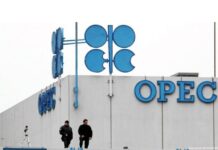
SINGAPORE: Oil prices dipped on Thursday as emerging market turbulence weighed on sentiment, while a deadline neared for a potential new round of U.S. tariffs on another $200 billion of Chinese goods.
U.S. sanctions against Iran, however, prevented prices from falling further as they are expected to tighten the market after being implemented from November, traders said.
U.S. West Texas Intermediate (WTI) crude futures were at $68.59 per barrel at 0645 GMT, down 13 cents, or 0.2 percent, from their last settlement.
Brent crude futures fell by 4 cents, to $77.23 a barrel.
Emerging market woes are weighing on global economic growth prospects, with Asian shares on Thursday heading for their sixth straight session of losses.
Meanwhile, a public comment period on possible U.S. tariffs on another $200 billion of Chinese goods ends on Thursday, with expectations that U.S. President Donald Trump will impose the additional levies.
OIL DEMAND STILL STRONG
U.S. crude stockpiles fell last week as refineries boosted output amid strong consumption, data from industry group the American Petroleum Institute showed on Wednesday.
Crude inventories fell by 1.17 million barrels to 404.5 million barrels in the week to Aug. 31, while refinery crude runs rose by 198,000 barrels per day (bpd), the data showed.
The Organization of the Petroleum Exporting Countries (OPEC) said on Wednesday it expected global oil demand to break through 100 million bpd for the first time this year.
Meanwhile, there are concerns that U.S. sanctions against Iran, which will target the OPEC-member’s oil industry from November, will tighten global supply.
A further risk is seen in OPEC-member Venezuela, where a government and political crisis has halved oil production in the last two years to little more than 1 million bpd.
Backwardation describes a forward curve in which prices for immediate delivery are higher than those for dispatch later on. This signals tight market conditions as it gives traders an incentive to immediately sell oil instead of putting it into storage.
Front-month Brent crude is currently more than $3 per barrel more expensive than for September 2019.






















